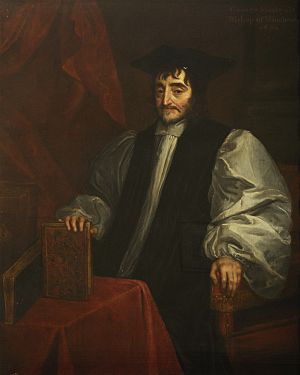George Morley (bishop) facts for kids
Quick facts for kids The Right Reverend George Morley |
|
|---|---|
| George Morley, as Bishop of Winchester | |

Portrait by Peter Lely
|
|
| Church | Church of England |
| Diocese | Winchester |
| See | Bishop of Winchester |
| In Office | May 1662 to October 1684 |
| Predecessor | Brian Duppa |
| Successor | Peter Mews |
| Other posts | Dean of Christ Church (26 July 1660–1660) Bishop of Worcester (1660–1662) Dean of the Chapel Royal (1663 – February 1668) |
| Personal details | |
| Born | 27 February 1598 Cheapside, London |
| Died | 29 October 1684 (aged 86) Farnham, Surrey, England |
| Buried | Winchester Cathedral |
| Nationality | English |
| Denomination | Church of England |
| Residence | Farnham Castle (at death) |
| Parents | Francis Morley & Sarah née Denham |
| Alma mater | Christ Church, Oxford |
George Morley was an important leader in the Church of England. He lived from 1598 to 1684. He served as a bishop in two different places. First, he was the Bishop of Worcester from 1660 to 1662. After that, he became the Bishop of Winchester from 1662 until his death in 1684.
Early Life and Education
George Morley was born in London, England, in February 1598. His parents were Francis Morley and Sarah Denham. He went to school at Westminster School and then studied at Christ Church, Oxford University.
He earned his first degree (BA) in 1618. He then completed his master's degree (MA) in 1621. During the 1620s and 1630s, he spent time with important thinkers. These included Lucius Cary, 2nd Viscount Falkland. He also worked as a personal chaplain for Robert Dormer, 1st Earl of Carnarvon.
In 1640, he became a priest in Hartfield, Sussex. The next year, he was made a canon at Christ Church, Oxford. He then moved to work as a rector in Mildenhall, Wiltshire.
A Time of Trouble: Civil War
In 1642, George Morley gave a sermon to the House of Commons. However, his speech caused some disagreement. Later, in 1647, he strongly opposed a visit by Parliament to Oxford University. Because of this, he lost his position as a canon and his church job.
He then left England and joined the court of King Charles II. He became a leading church figure in The Hague, a city in the Netherlands. Before the king returned to power in England, Morley went on a special trip. He successfully convinced many Presbyterians to support King Charles.
Becoming a Bishop
When the king was restored to power in 1660, Morley got his canon position back. Soon after, he became the Dean of Christ Church. In the same year, he was made the Bishop of Worcester. He was officially chosen on October 9 and became a bishop on October 28.
In 1661, he was the main representative for the bishops at the Savoy Conference. This was an important meeting about the Church of England. In 1662, he became the Bishop of Winchester. He also became the Dean of the Chapel Royal in 1663. He held this role until King Charles II removed him in 1668.
His Writings
George Morley did not write many books. His works were mostly arguments or defenses of his views. One example is his writing defending himself from criticisms by Richard Baxter.
| Academic offices | ||
|---|---|---|
| Preceded by Edward Reynolds |
Dean of Christ Church, Oxford 1660 |
Succeeded by John Fell |
| Church of England titles | ||
| Vacant
Title last held by
John Prideaux |
Bishop of Worcester 1660–1662 |
Succeeded by John Gauden |
| Preceded by Brian Duppa |
Bishop of Winchester 1662–1684 |
Succeeded by Peter Mews |
| Preceded by Gilbert Sheldon, Bishop of London |
Dean of the Chapel Royal 1663–1668 |
Succeeded by Herbert Croft, Bishop of Hereford |
 | Dorothy Vaughan |
 | Charles Henry Turner |
 | Hildrus Poindexter |
 | Henry Cecil McBay |

